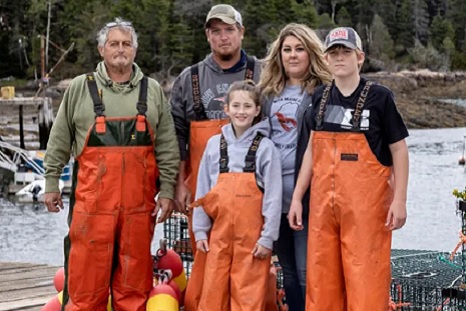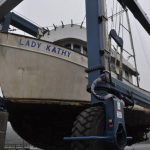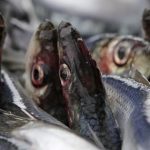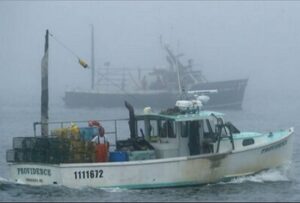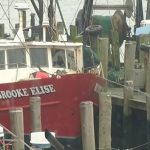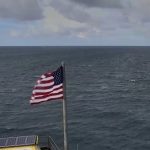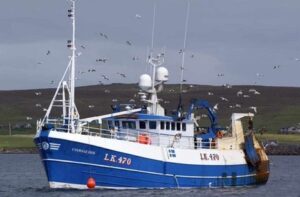Tag Archives: Conservation Law Foundation
Massachusetts lobster fishing limits to protect whales restored by appeals court
 A federal appeals court on Thursday restored a U.S. agency rule restricting lobster and Jonah crab fishing off the Massachusetts coast to protect endangered whales, rejecting a claim that the agency did not deserve deference under a recent landmark Supreme Court case. In a 3-0 decision, the 1st U.S. Circuit Court of Appeals in Boston said the National Marine Fisheries Service acted lawfully in banning from Feb. 1 to April 30 annually the use of vertical buoy lines in a 200-nautical-mile area of federal waters called the Massachusetts Restricted Area Wedge. The Massachusetts Lobstermen’s Association sued to block the rule, saying a Dec. 2022 appropriations rider reflected the U.S. Congress’ intent not to extend emergency protections for North Atlantic right whales from earlier that year. more, >>CLICK TO READ<< 19:21
A federal appeals court on Thursday restored a U.S. agency rule restricting lobster and Jonah crab fishing off the Massachusetts coast to protect endangered whales, rejecting a claim that the agency did not deserve deference under a recent landmark Supreme Court case. In a 3-0 decision, the 1st U.S. Circuit Court of Appeals in Boston said the National Marine Fisheries Service acted lawfully in banning from Feb. 1 to April 30 annually the use of vertical buoy lines in a 200-nautical-mile area of federal waters called the Massachusetts Restricted Area Wedge. The Massachusetts Lobstermen’s Association sued to block the rule, saying a Dec. 2022 appropriations rider reflected the U.S. Congress’ intent not to extend emergency protections for North Atlantic right whales from earlier that year. more, >>CLICK TO READ<< 19:21
Conservationists seek permanent marine protection for Cashes Ledge off Cape Ann
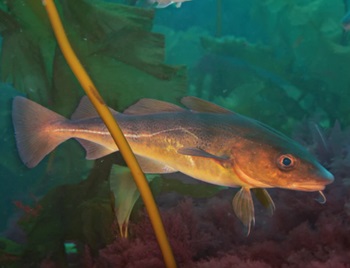 The Conservation Law Foundation, based in Boston, submitted a nomination to the National Oceanic and Atmospheric Administration (NOAA) today to designate Cashes Ledge as a sanctuary. National marine sanctuaries are permanently protected from fishing, shipping and ocean dumping and offer a haven for marine life and an undisturbed ecological site for scientific research. The nomination triggers a yearslong review process that could lead to the 766-square mile site being formally designated. The area is currently under fishing restrictions set by the New England Fisheries Management Council, but the conservation foundation said those limits are always subject to change and leave this habitat vulnerable. more, >>CLICK TO READ<< 08:05
The Conservation Law Foundation, based in Boston, submitted a nomination to the National Oceanic and Atmospheric Administration (NOAA) today to designate Cashes Ledge as a sanctuary. National marine sanctuaries are permanently protected from fishing, shipping and ocean dumping and offer a haven for marine life and an undisturbed ecological site for scientific research. The nomination triggers a yearslong review process that could lead to the 766-square mile site being formally designated. The area is currently under fishing restrictions set by the New England Fisheries Management Council, but the conservation foundation said those limits are always subject to change and leave this habitat vulnerable. more, >>CLICK TO READ<< 08:05
The Offshore Wind Energy Scandal Is Even Worse Than You Think
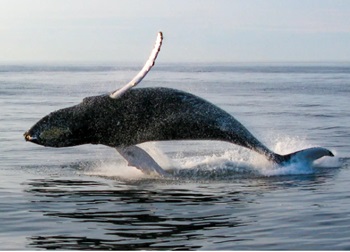 These 11 charts show how America’s biggest NGOs are colluding with foreign corporations that want to industrialize our oceans with thousands of turbines that will hurt whales and ratepayers Two of Europe’s biggest energy companies are abandoning the SS Offshore Wind. In May, Shell, the UK-based oil and gas giant (2023 revenue: $317 billion), announced that it was cutting staff from its offshore wind business because, according to Bloomberg, the company has decided to focus on markets that “deliver the most value for our investors and customers.” Bloomberg also reported that the staff cuts were made after the departures of top executives in the company’s offshore wind and renewable power businesses. Lots of informative grafs. more, >>CLICK TO READ<< 09:29
These 11 charts show how America’s biggest NGOs are colluding with foreign corporations that want to industrialize our oceans with thousands of turbines that will hurt whales and ratepayers Two of Europe’s biggest energy companies are abandoning the SS Offshore Wind. In May, Shell, the UK-based oil and gas giant (2023 revenue: $317 billion), announced that it was cutting staff from its offshore wind business because, according to Bloomberg, the company has decided to focus on markets that “deliver the most value for our investors and customers.” Bloomberg also reported that the staff cuts were made after the departures of top executives in the company’s offshore wind and renewable power businesses. Lots of informative grafs. more, >>CLICK TO READ<< 09:29
Here’s how activists use lobstermen as bait to endanger Maine industry, communities
 Far left activists are exploiting the recent death of an endangered whale to imperil the future of Maine’s iconic lobster fishery. These organizations have poor command of the facts and no knowledge of our industry. Their agitating imperils our fishery and the working communities that depend on it. Organizations like the National Resources Defense Council, the Conservation Law Foundation and others are exploiting this event to pressure regulators to impose new rules. These organizations are restless and can claim some success. A self-styled watchdog called Seafood Watch convinced Whole Foods to stop stocking Maine lobster products late in 2022. 3 Videos, more, >>click to read<< By Dustin Delano 16:12
Far left activists are exploiting the recent death of an endangered whale to imperil the future of Maine’s iconic lobster fishery. These organizations have poor command of the facts and no knowledge of our industry. Their agitating imperils our fishery and the working communities that depend on it. Organizations like the National Resources Defense Council, the Conservation Law Foundation and others are exploiting this event to pressure regulators to impose new rules. These organizations are restless and can claim some success. A self-styled watchdog called Seafood Watch convinced Whole Foods to stop stocking Maine lobster products late in 2022. 3 Videos, more, >>click to read<< By Dustin Delano 16:12
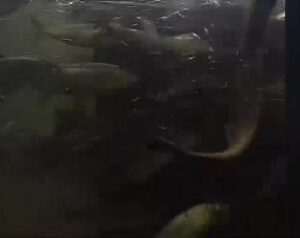
Environmental groups withdraw lawsuit over last Maine salmon
A coalition of environmental groups said Monday it is withdrawing a lawsuit against a renewable energy giant that it has accused of jeopardizing the last remaining wild Atlantic salmon in the U.S. The groups sued Brookfield Renewable, claiming the company kills salmon on the Kennebec River with its dams. Atlantic salmon only return to a handful of U.S. rivers, all in Maine, and they are protected under the Endangered Species Act. The conservationists were dealt a setback last month when the federal government ruled the salmon can coexist with hydroelectric dams on the Kennebec, as long as upgrades are eventually made to allow salmon to pass through the dams more easily. >click to read< 12:15
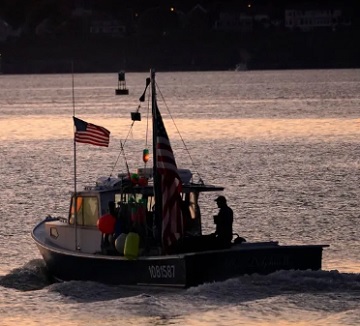
Maine delegation adds 6-year pause on lobster rules to federal spending bill
Maine’s congressional delegation has inserted a six-year pause on new regulations intended to protect endangered right whales into a key federal spending package as it seeks to protect a lobster industry that says it is under siege. The provision will help a vital Maine industry that had been hit with too many regulations despite its lack of threat to the endangered whales, Sens. Susan Collins and Angus King, Reps. Chellie Pingree and Jared Golden and Gov. Janet Mills said in a statement. The late-breaking move comes just days before Congress is expected to approve a massive $1.7 trillion spending bill that would fund the government through next fall. >click to read< 13:34

Maine political leaders push provision in federal spending bill decried by environmental groups as threat to right whales
Members of the delegation, including US Senator Susan Collins, said they plan to push a provision in the spending bill that would revive for 10 years federal fisheries rule that environmental groups successfully challenged in court earlier this year. Congressional leaders announced a framework for the spending legislation last Tuesday, and plan to use the days before Christmas to finalize details. In a letter Friday to Democratic congressional leaders, 15 environmental groups urged lawmakers to leave the language out of the spending bill. “This is a profound and disturbing end run around the legal system,” said Erica Fuller, senior attorney for the Conservation Law Foundation in Boston, on Saturday in a phone interview. >click to read< 07:44

Maine lobster group backs new speed limit on ships to protect whales
A proposal to expand speed limits along the East Coast might have little impact on vessels off Maine and is not directly linked to two lawsuits over pending federal regulations for the state’s lobster fishery. Still, the groups involved in that litigation recently weighed in on the speeding proposal, which is part of broader efforts to save right whales from extinction. The Maine Lobstermen’s Association and four conservation groups supported the stricter limits but took issue with other aspects of the rules and reiterated the priorities that have driven their court battles. >click to read< 09:31

NH to join Maine in challenging North Atlantic right whale fishing regulations
Gov. Chris Sununu announced New Hampshire would join the state of Maine in federal court to appeal a Biden administration regulation to protect the endangered north Atlantic right whales that he said would cripple the region’s lobster industry. A U.S. District Court judge last month upheld a National Marine Fisheries Services (NMFS) regulation environmental groups sought in response to the whale population, estimated to be around 340 animals in the Atlantic waters of the U.S. and Canada. “This ruling, if upheld, would devastate New England’s lobster industry with restrictive regulations brought on by the federal government,” Sununu said in a statement. >click to read< 08:52

Lobster harvesters worry about survival of their livelihoods
The state’s lobster industry is bracing as federal regulators consider additional requirements they claim are needed to protect the endangered North American right whale, proposals many fear could spell doom for the industry and the coastal communities that it supports. Squaring off in this battle are national environmental and animal rights organizations versus Maine and its lobster harvesters. The legal war began in January 2018 when the Center for Biological Diversity, the Defenders of Wildlife, the Humane Society of the United States, and the Conservation Law Foundation filed a lawsuit in the U.S. District Court of D.C. against the U.S. Department of Commerce and the NOAA. The environmental and animal rights groups claimed the federal agencies had not done enough to protect the North Atlantic right whale from lobster harvesting. >click to read< 12:42

Maine lobstermen, politicians rally in protest of fishing restrictions and Seafood Watch’s recommended boycott
At a rally in Portland’s Old Port on Friday, they protested a federal judge’s ruling issue Thursday allowing the National Marine Fisheries Service, a branch of the National Oceanic and Atmospheric Association to impose limits on where and how lobstermen fish in order to protect endangered North Atlantic Right Whales. The rally was also protesting Seafood Watch, a California-based sustainable seafood advocacy group affiliated with the Monterey Bay Aquarium, now recommending food distributors and restaurants boycott Maine lobster in the name of saving the whales. Video, >click to read< 09:55
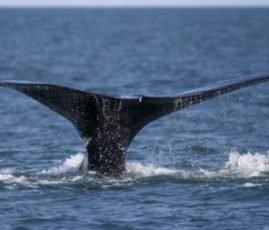
Federal court rules fisheries officials didn’t do enough to protect right whales from lobster gear
A federal court on Friday ruled in favor of environmental groups that had filed a lawsuit against the government and the Maine Lobstermen’s Association claiming federal fisheries officials had failed to protect endangered North Atlantic right whales from potentially fatal entanglements in lobster fishing gear, records show. A judge ruled that NOAA Fisheries had violated the Marine Mammal Protection Act and Endangered Species Act when it issued a May 2021 biological opinion and a September 2021 final rule because officials had not done enough to reduce the lobster fishery’s threat to right whales, the plaintiffs in the suit said in a statement. >click to read< 18:00
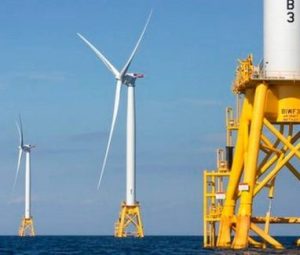
Wind farm, groups agree on whale protections
The developers of an offshore wind farm and three environmental organizations announced Monday that they have reached an agreement to further protect rare North Atlantic right whales during construction and operation of the energy-generating project. The agreement involving Orsted and Eversource, developers of South Fork Wind off the coast of New England and New York, was signed by the National Wildlife Federation, the Natural Resources Defense Council and the Conservation Law Foundation, the groups said in a joint statement. >click to read< 21:08

Regulators say newer new Right whale rules are coming for Maine’s lobster fleet/fixed gear fisheries
Federal regulators said they will soon start a process to create new whale-protection rules for Maine’s lobster fleet that will go beyond the controversial regulations going into effect on May 1. Michael Pentony, the regional administrator for NOAA, spoke to an online meeting of the Maine Fishermen’s Forum today. He said that the initial rules were designed to reduce the risk to whales by 60%, but recent evidence shows that the agency must act more quickly than planned to reduce that risk even more. “But as we got new information late last fall… for the right whale population, we now know that we need a 90% risk reduction,” >click to read< 11:50
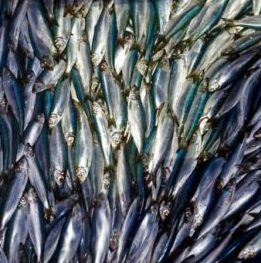
Fishermen sue to end industry funded monitoring program
A group of fishing companies in New England is bringing its bid to try to end industry-funded monitoring programs to federal appeals court. The companies are part of the industry that harvests Atlantic herring, which are heavily fished off the East Coast. The federal government requires herring fishing boats to participate in, and pay for, at-sea monitoring programs. >click to read< 13:30

ACK Residents Against Turbines not aligned with fossil fuel money
The Jan. 21 article by Doug Fraser, “Nuclear and Fossil Fuel Advocates, Wind Foes Among Backers of Right Whale Protection Suits,” misleads the public by attempting to draw a false link between ACK Residents Against Turbines, which opposes development of industrial-scale wind farms off the coast of New England, and other groups associated with the fossil fuel industry. Some groups oppose industrial offshore wind development because it will harm pristine ocean views enjoyed by all; others are opposed to the dramatic increase in electric rates experienced by countries that have adopted it or to the devastating impact it will have on commercial fishing. These are all valid concerns. ACK Residents Against Turbines is opposed to the industrialization of our ocean because the turbines, massive offshore substations, and vast undersea high voltage cable systems will damage the fragile marine ecosystem. >click to read< 15:12 By Vallorie Oliver President, Nantucket Residents Against Turbines
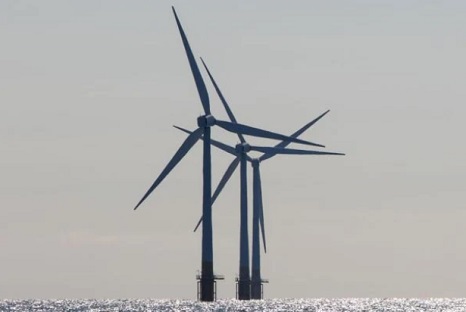
Martha’s Vineyard lobstermen oppose NOAA “incidental take” decision
Lobstermen Wayne Iacono and Wes Brighton expressed frustration at the “double-standard” that NOAA seems to be playing by giving Vineyard Wind an incidental “take” count. The Marine Mammals Protection Act defines take as “to harass, hunt, capture, or kill, or attempt to harass, hunt, capture, or kill any marine mammal.” Vineyard Wind is allowed some incidental take, which is “unintentional, but not unexpected, taking,” according to NOAA. One species, in particular, the lobstermen are worried about is the endangered North Atlantic Right Whale. >click to read< 15:41

Right whale coalition calls for moratorium of offshore wind farm turbines
A local citizens group has announced the creation of the Save Right Whales Coalition, which is determined to stop offshore wind turbine projects that members say could harm whales. “Any species whose numbers are this low requires that we not take any additional action that could harm these whales,” political and environmental author and activist Michael Shellenberger said of the endangered North Atlantic right whales. “Particularly given that we have an abundance of nuclear and natural gas resources that would provide a sufficient alternative to these large industrial wind turbines.” >click to read< 13:49

Fed appeals court reinstates lobster gear restrictions off Maine’s coast
A federal appeals court is reinstating restrictions on fishing gear in a nearly 1,000-square-mile swathe of ocean off Maine’s coast. In October, in an effort to protect the roughly 340 right whales remaining on the planet from potentially deadly entanglements with fishing gear, the federal government imposed a four-month restriction on the use of trap-rope in the area. Before the restrictions took effect, the Maine Lobstering Union won a stay from a U.S. district judge in Bangor. But Late Tuesday, a federal appeals court in Boston ruled that the lower court overstepped its authority. >click to read< 10:16

Judge rejects efforts by feds, enviro’s to impose immediate restrictions on lobstering
Last month, Justice Lance Walker sided with the Maine Lobstering Union and granted a temporary injunction to stop a new federal closure of a roughly 960-square mile area off the Maine coast. The federal agencies appealed that decision and asked for an emergency “stay” of the order, contending the closure is essential now to protect endangered right whales. On Friday, Justice Walker denied that request, meaning the area remains open to fishing. >click to read< 16:10

Feds, con groups file appeal to reinstate seasonal lobstering ban
In their appeal, the federal government and the conservation groups, the Center for Biological Diversity, the Conservation Law Foundation and the Defenders of Wildlife, argue that not only did the National Marine Fisheries Service use the best available science, but also that the lobstering groups did not present any actual evidence of the “certain economic harms” the judge referenced. Also in the appeal, the groups claim that the plaintiffs’ criticism of the availability and quality of data to support the restrictions is misplaced. The fisheries service admitted that more data would be beneficial to refine the agency’s understanding of right whale distribution, but it argued that the data already available is sufficient. >click to read< 08:02

Biological Opinion to Protect Right Whales Met With Opposition on All Sides
The National Marine Fisheries Service (NMFS) released a key report called a Biological Opinion yesterday that calls for a 98 percent reduction in risk to North Atlantic right whales over the next 10 years. The goal is meant to be achieved over the course of four phases that correspond with increasingly tight restrictions on lobster and crab fisheries as well as other fixed-gear fisheries that use vertical buoy ropes. Vertical ropes attached to trap/pot gear is known to lethally entangle the whales. >click to read< 16:38
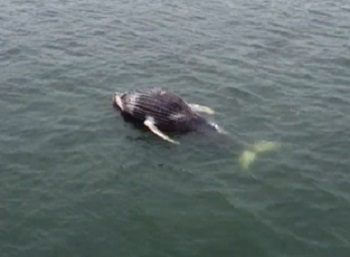
Enviros sue for North Atlantic Right Whale protections from ship strikes
Four conservation groups filed an injunction in a Washington, D.C., court last week asking the National Marine Fisheries Service to expand its efforts to protect right whales and their calves from being hit by ships. Although entanglement in fishing lines gets a lot of headlines, ship strikes have emerged as a prime killer of the right whales, whose numbers have dropped from a peak of 481 in 2011 to 356 this year. Eleven calves, including two that were spotted Wednesday off Amelia Island, Florida, so far this calving season are not accounted for in that estimate. >click to read< 09:50
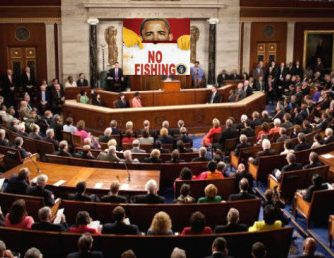
President Biden’s flurry of actions to protect the environment reignites a controversy about the Atlantic’s only marine monument
Last June, as part of a concerted campaign to dismantle the environmental policies of the Obama administration, Donald Trump met with fishermen in Maine and signed a proclamation that allowed commercial fishing in nearly 5,000 square miles of federally protected waters southeast of Cape Cod. In all, Biden ordered federal agencies to begin reviewing and restoring more than 100 environmental regulations that were dismantled or weakened by the Trump administration. While many of Biden’s orders could have a significant impact on New England, the review of the (Northeast Canyons and Seamounts) marine monument, a Connecticut-sized area that lies about 130 miles southeast of Provincetown, has stirred immediate controversy. >click to read< 11:44

Shortsighted Petition about whale regulations in Mass draws response from Maine
Enviro groups have filed a petition with the NMFS seeking immediate emergency action requiring the commercial fishing industry to protect endangered right whales from entanglement off the coast of Massachusetts. Members of Maine’s Congressional delegation responded in opposition to that petition with a letter to the Department of Commerce, calling it shortsighted. The petition suggests ropeless fishing could be used, and even though it targets Massachusetts, Maine’s commercial fishing industry is watching, according to Mike Dassatt, who is on the board of the Downeast Lobsterman’s Association,, “We need to be supporting Massachusetts because here in Maine, it would put way too many people out of business,”,, >click to read< 07:15
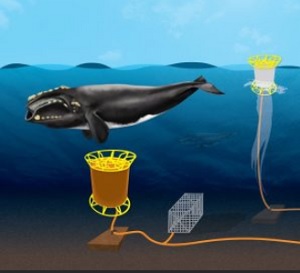
Emergency Petition! Awaiting Court-Ordered Help, Enviro’s Want Ban on Some Lobster Traps, pushing newer ropeless traps
“We filed this petition because it is an emergency situation,” Kristen Monsell, oceans legal director at the Center for Biological Diversity,,, Monsell and colleagues brought a lawsuit against the federal government in 2018, challenging how it has managed lobster fishing and arguing for better right whale protections. In April, U.S. District Judge James Boasberg ordered the National Marine Fisheries Service to issue new regulations by the end of May of 2021. In the interim, the petitioners say it’s necessary to ban vertical lines. That could happen without banning lobster fishing outright, since newer, ropeless traps don’t pose the same risks to the whales. >click to read< 07:12
Emergency Petition Seeks to Protect Endangered North Atlantic Right Whales From Fishing Gear – >click to read<
Today, the Humane Society of the United States and Humane Society Legislative Fund, along with our coalition partners,,, >click to read<
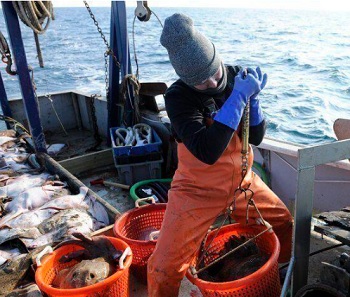
Fishing group asks Baker to fight ‘crippling’ monitor measure
The Northeast Seafood Coalition is trying to enlist Gov. Charlie Baker in its campaign against the monitoring measure that it charges has the “strong potential” to financially cripple the state’s commercial groundfish industry. The Gloucester-based coalition sent Baker a letter last Friday laying out its case that Amendment 23, which will set future monitoring levels for sector-based, Northeast commercial groundfish vessels is highly flawed and should be withdrawn by the New England Fishery Management Council. >click to read< 12:47

Boasberg sets deadline for new North Atlantic Right Whale Protections no later than May 31, 2021
The Center for Biological Diversity, Conservation Law Foundation, Defenders of Wildlife and the Humane Society of the United States sued the federal government for violating the Endangered Species Act by allowing the lobster fishery to operate in a manner known to entangle right whales. U.S. District Court Judge James E. Boasberg also ordered a new ESA-mandated analysis of the American lobster fishery that takes into account the full scope of its harm to right whales. He stopped short of prohibiting lobster fishing with vertical buoy lines in a key right whale feeding area, which the groups had requested as an interim measure. >click to read< 07:15
Judge: Lobstering can proceed until new right whale protections are finalized in May – The right whale protection lawsuit winding its way through the federal courts for two years has often been called the “wild card” in the battle between environmental groups trying to save the critically endangered whale from extinction and Maine lobstermen trying to protect their way of life. >click to read< 17:24






